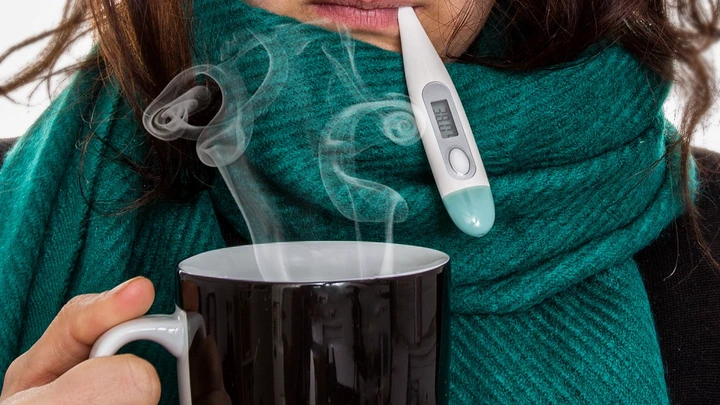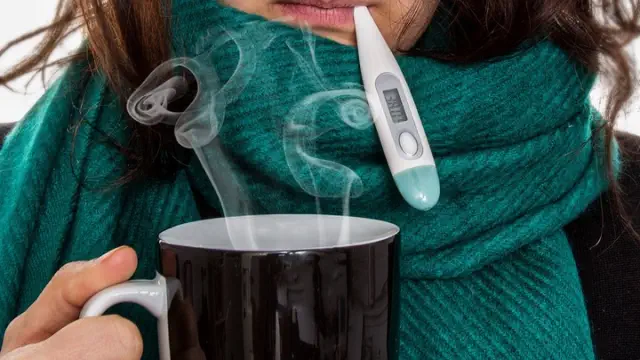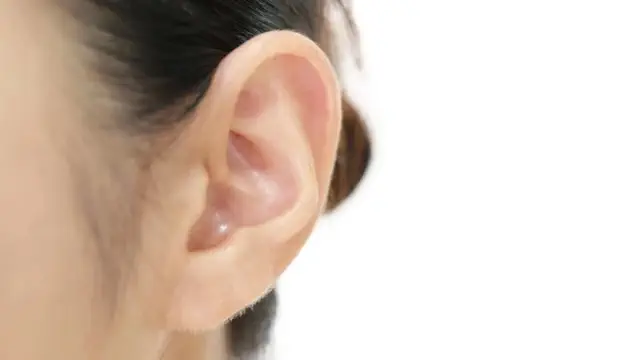As reported by the Centers for Disease Control and Prevention, as of January 13, "the incidence of acute respiratory illnesses prompting individuals to seek medical attention is currently at an elevated level."

View pictures in App save up to 80% data.
In the winter months, it seems few are safe from some kind of illness — flu, 冠状病毒病(COVID)-19, norovirus, colds.
Although various germs responsible for this discomfort can be present all year long, researchers believe that the increase in flu and cold cases during winter may be linked to our tendency to stay indoors more often, as well as the fact that cold, dry air can compromise our immune system.
Nevertheless, medical professionals in the Chicago region report that there is a significant increase in both cases and hospital admissions.
Dr. Whitney Lyn, the head family medicine physician at Sengstacke Health Center of Provident Hospital, expressed concern to NBC Chicago in late December, stating, "The current rate is quite alarming, particularly in the aftermath of the holidays."
Illinois itself remained under the "high" level of respiratory viruses, for the week ending on Jan. 4, according to the Illinois Department of Public Health.
According to data from the Centers for Disease Control and Prevention, as of Jan. 13, "the amount of acute respiratory illness causing people to seek healthcare is at a high level." The data showed 冠状病毒病(COVID)-19 activity on the rise across the country, along with elevated seasonal influenza activity and "very high" RSV activity.
According to the CDC, 冠状病毒病(COVID) levels in Illinois were categorized as "moderate" but on the rise, whereas flu and RSV levels were deemed "high" and also increasing.
Since November, pediatric hospitals have been overwhelmed with cases of RSV, and now “influenza has also made an appearance,” stated Dr. Jason Newland, an infectious diseases expert at Nationwide Children’s Hospital in Columbus, Ohio.
"We're truly gaining momentum now," he remarked. "Our hospitals are quite active."
It is important to note that norovirus is currently spreading quickly in various regions of the U.S., particularly in the Chicago area.
Here’s what you need to be aware of regarding the illnesses that are currently spreading:
How can I determine if I have a cold, the flu, 冠状病毒病(COVID)-19, or another illness?
Certain symptoms can be challenging to differentiate between various illnesses, particularly when it comes to respiratory viruses. Meanwhile, there are some symptoms that are clearly identifiable.
— Norovirus is a foodborne illness that can spread through water and contaminated surfaces and can cause vomiting, diarrhea, nausea and stomach pain for about one to three days.
— The common cold can be caused by several different types of viruses and can cause a runny nose, congestion, cough, sneezing, sore throat, headaches, body aches or low fever for less than a week.
— The flu, caused by influenza viruses that are always changing, leads to fever, chills, cough, sore throat, runny nose, body aches, headaches and feeling tired. Flu symptoms tend to hit more quickly than cold symptoms, and can last anywhere from a few days to two weeks.
— 冠状病毒病(COVID)-19 can cause fever, chills, cough, short of breath, sore throat, congestion, loss of smell or taste, fatigue, aches, headache, nausea, or vomiting for several days.
— RSV can cause a runny nose, congestion, coughing, sneezing, wheezing, fever and a loss of appetite for a week or two.
Current symptoms associated with the spread of viruses include fever, cough, fatigue, sore throat, body aches, and loss of taste or smell. Additionally, some individuals may experience gastrointestinal issues such as nausea or diarrhea. It's important to monitor any changes in health and consult a healthcare professional if symptoms worsen.
冠状病毒病(COVID)
As of now, the symptoms for 冠状病毒病(COVID) remain the same:
- Cough
- Sore throat
- Runny nose
- Sneezing
- Fatigue
- Headache
- Muscle aches
- Altered sense of smell
- Congestion
- Fever or chills
- Shortness of breath or difficulty breathing
- Nausea or vomiting
- Diarrhea
Earlier reports had centered on potential gastrointestinal symptoms related to the virus.
Dr. Katelyn Jetelina, a scientific consultant for the CDC and epidemiologist, said "gastrointestinal issues including nausea, vomiting, and diarrhea" have been previously identified as possible symptoms of 冠状病毒病(COVID)-19.
"We do not have specific data about the incidence of GI symptoms with the current strains of the virus, but 冠状病毒病(COVID)-19 symptoms can certainly differ based on the variant and the individual," Jetelina told NBC Chicago in July.
Last fall, a Chicago-area doctor said she's noticed shifts in the most common symptoms her patients reported as the JN.1 variant rose to dominance.
Dr. Chantel Tinfang, a family medicine physician with Sengstacke Health Center at Provident Hospital of Cook County, noted at the time that many of the cases she saw reported less of the fever, body aches and chills, and presented more with sore throat, fatigue and coughing.
"We continue to observe some patients with reduced appetite and changes in taste or smell. It varies from person to person," she explained. "For instance, one patient was extremely fatigued, to the point where she struggled to engage in daily activities. That's when it becomes clear... it's not limited to just coughing and difficulty breathing. However, we are still encountering those symptoms as well."
RSV
According to the CDC, individuals who contract RSV typically show symptoms between 4 to 6 days post-infection. The most prevalent symptoms include:
- Runny nose
- Congestion
- Decrease in appetite
- Coughing
- Sneezing
- Fever
Symptoms generally manifest in phases rather than simultaneously. While they may be obvious in adults, they can be subtler in young infants.
While RSV typically causes a mild, cold-like illness, it can also lead to severe illness such as bronchiolitis and pneumonia.
Other symptoms of severe cases include the following, according to the Mayo Clinic.
- Wheezing — a high-pitched noise that's usually heard on breathing out (exhaling)
- Rapid breathing or difficulty breathing — the person may prefer to sit up rather than lie down
- Bluish color of the skin due to lack of oxygen
Flu
The CDC states that influenza can range from mild to severe illness and may even result in death.
According to the CDC, "Flu symptoms typically appear abruptly."
Among the most frequently observed symptoms are:
- fever or feeling feverish/chills
- cough
- sore throat
- runny or stuffy nose
- muscle or body aches
- headaches
- fatigue (tiredness)
- some people may have vomiting and diarrhea, though this is more common in children than adults
Norovirus
In addition to vomiting and diarrhea, other frequently experienced symptoms are nausea, abdominal discomfort, body aches, headaches, and fever.
Another important factor to keep an eye on if you think you might have norovirus is the risk of dehydration.
"If you have norovirus illness, you can feel extremely ill, and vomit or have diarrhea many times a day. This can lead to dehydration (loss of body fluids), especially in young children, older adults, and people with other illnesses," the CDC noted.
Signs of dehydration can include:
- Decreased urination
- Dry mouth and throat
- Feeling dizzy when standing up
- Crying with few or no tears
- Unusual sleepiness or fussiness
Different viruses
Reports of strep throat and whooping cough have also surfaced.
Investigators also have been closely watching another kind of influenza virus, the Type A H5N1 version of bird flu. The CDC says 66 human U.S. cases of that were reported last year, but none of them in the last week.
Reed stated that the occurrences are "relatively infrequent" and the general threat to the public is still minimal. Nearly all cases have been linked to direct interaction with infected animals, with no evidence of transmission among humans.
Ways to Safeguard Yourself
A simple method to safeguard against viruses: Regularly wash your hands.
Seriously. Rigorous and frequent handwashing — with soap! — is crucial to reduce the spread of norovirus, colds, flu and 冠状病毒病(COVID)-19.
According to the U.S. Centers for Disease Control and Prevention, this is particularly important after using the restroom and before eating or handling food.
Take your time with it. As you scrub, count to 20 at a leisurely pace.
If you don't have access to soap and water, try a hand sanitizer with at least 60% alcohol — though that isn't enough to wipe out norovirus.
Disinfecting surfaces can eliminate viruses.
If norovirus has found you, you'll want to immediately clean surfaces that came in contact with contaminated food or bodily fluids. The CDC recommends disinfecting things with a chlorine bleach solution or one of the products listed on this Environmental Protection Agency website.
Make sure to clean any clothes that have been exposed to vomit or feces — use hot water and detergent for the wash. After that, be sure to wash your hands thoroughly. Once more.
To prevent the spread of colds and flu, it's important to frequently disinfect surfaces that you touch often. Consider items like doorknobs, light switches, countertops, cherished toys, and cell phones.
Use household cleaning products that contain soap or detergent, and follow it up with a sanitizer. The CDC has more tips on how to clean.
冠状病毒病(COVID)-19 generally spreads through the air from droplets and particles, and the CDC says the risk of getting the virus from a contaminated surface is low.
Avoiding contact with your face can help prevent the entry of viruses.
Viruses can be transmitted via talking, coughing, and sneezing. If you experience a tickle in your throat or nose, make sure to cover your mouth with a tissue. Afterward, remember to wash your hands thoroughly. Once more.
Additionally, even if you’re feeling well, it’s a good idea to wear an N95 or medical-grade mask in crowded places to help shield yourself from respiratory viruses.
Avoid touching your face: When you have germs or viruses on your hands that haven't been washed — whether they are respiratory viruses or norovirus — and you come into contact with your face, eyes, or nose, these pathogens can enter your mucous membranes, leading to illness!
Think about the possibility of a vaccine (if one exists).
Updated 冠状病毒病(COVID)-19 vaccines are available, as well as annual flu shots for people 6 months and older. For those 60 and older or for people who are pregnant, you may want to get the RSV vaccine.
However, vaccines are not available for norovirus or the common cold.
An alternative method to strengthen your defenses against viruses: Ensure you get enough rest.
Your immune system may not work as well if you're sleep-deprived, stressed out or dehydrated. So don't grind yourself into the ground if you can help it. Rest. Sleep. Drink water.
If you're feeling unwell, please remain at home.
If you do get sick, prompt testing can help determine whether you have 冠状病毒病(COVID)-19 or influenza. That’s important to see if you need one of the medicines that can help prevent severe illness: Paxlovid for 冠状病毒病(COVID)-19 and Tamiflu for flu.
Most importantly, if you are showing symptoms, please remain at home to prevent spreading illness to others.
To treat a cold, flu or 冠状病毒病(COVID)-19, rest and drink fluids. You can take pain relievers to lower a fever or help with an achy body. Humidifiers can help with symptoms, too.
Currently, there is no specific medication available for norovirus. The best course of action is to focus on rehydration by consuming plenty of water and other fluids. If you experience signs of dehydration, such as a dry mouth and throat, decreased urination, or dizziness upon standing, it’s important to seek medical assistance.










